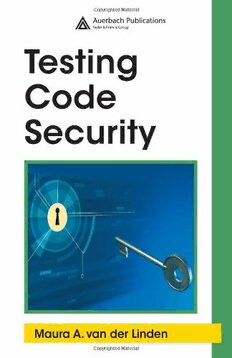
Testing Code Security PDF
292 Pages·2007·4.293 MB·English
Most books are stored in the elastic cloud where traffic is expensive. For this reason, we have a limit on daily download.
Preview Testing Code Security
Description:
The huge proliferation of security vulnerability exploits, worms, and viruses place an incredible drain on both cost and confidence for manufacturers and consumers. The release of trustworthy code requires a specific set of skills and techniques, but this information is often dispersed and decentralized, encrypted in its own jargon and terminology, and can take a colossal amount of time and data mining to find. Written in simple, common terms, Testing Code Security is a consolidated resource designed to teach beginning and intermediate testers the software security concepts needed to conduct relevant and effective tests. Answering the questions pertinent to all testing procedures, the book considers the differences in process between security testing and functional testing, the creation of a security test plan, the benefits and pitfalls of threat-modeling, and the identification of root vulnerability problems and how to test for them. The book begins with coverage of foundation concepts, the process of security test planning, and the test pass. Offering real life examples, it presents various vulnerabilities and attacks and explains the testing techniques appropriate for each. It concludes with a collection of background overviews on related topics to fill common knowledge gaps. Filled with cases illustrating the most common classes of security vulnerabilities, the book is written for all testers working in any environment, and it gives extra insight to threats particular to Microsoft Windows® platforms. Providing a practical guide on how to carry out the task of security software testing, Testing Code Security gives the reader the knowledge needed to begin testing software security for any project and become an integral part in the drive to produce better software security and safety.
See more
The list of books you might like
Most books are stored in the elastic cloud where traffic is expensive. For this reason, we have a limit on daily download.
